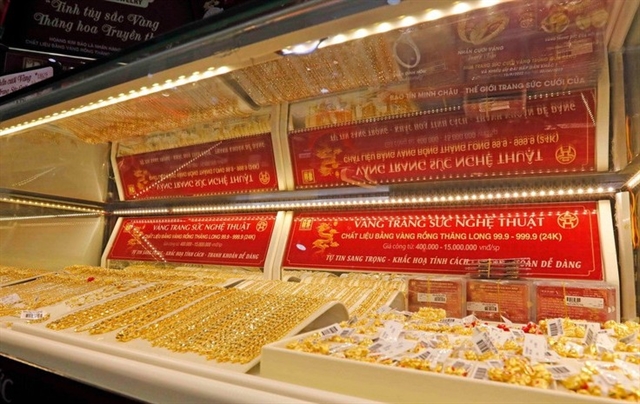 Economy
Economy

 |
| Gold for sales at a shop in Hai Bà Trưng District, Hà Nội. — VNA/VNS Photo |
HÀ NỘI — The Ministry of Finance has submitted a proposal to include in the draft amended Law on Personal Income Tax a provision to impose personal income tax on transactions involving gold bullion transfers, with an initial tax rate of 0.1 per cent of the transaction value.
The proposal excludes raw gold, gold jewellery and fine-art gold from taxation.
Nguyễn Quang Huy from the Faculty of Finance and Banking at Nguyễn Trãi University said the proposal marks a significant move reflecting the State’s effort to strengthen oversight of a market long associated with speculative risks and volatility.
In practice, gold bullion is mainly used for hoarding or short-term speculation. Therefore, taxing these transactions is necessary to enhance transparency, curb speculative trading and contribute to State budget revenue.
However, he noted that for most Vietnamese people, buying small amounts of gold to store is a long-standing cultural habit linked to financial security and prudence. Hence, the policy should include tax exemptions or reductions for small-scale, long-term holders. This would protect citizens’ legitimate interests and demonstrate the human-centred nature of tax administration, ensuring that the State primarily regulates large-scale speculation rather than traditional saving behaviour.
Huy said the proposed rate is low enough to avoid shocking the market or the public, yet meaningful in two key respects. First, it introduces a transparent mechanism where all gold bullion transactions must go through formal systems, enabling authorities to collect accurate data. Second, it provides the Government with an initial basis to observe market behaviour and make gradual adjustments later.
Meanwhile, Dr Nguyễn Ngọc Tú, a lecturer at the University of Business and Technology, argued that a 0.1 per cent tax on gold bullion transfers may be too low. This rate equals that applied to securities transactions and is lower than that imposed on real estate transfers, making it insufficient to curb speculative behaviour.
He pointed out that ordinary business households selling retail goods are subject to a 0.5 per cent tax rate. Since gold is not an investment the State encourages, applying a tax rate even lower than that levied on food, medicine or dairy trading seems inconsistent.
Economists have long advocated for the development of secure financial products such as gold certificates, gold-based exchange-traded funds (ETFs) and flexible government bonds, giving citizens more transparent and stable investment channels.
They have recommended an exemption threshold for small purchases of up to one tael (around 37.5 grams) per year to protect traditional saving habits, especially in rural areas. Long-term holdings could be rewarded through tax reductions or exemptions, encouraging stability over speculation. — VNS




